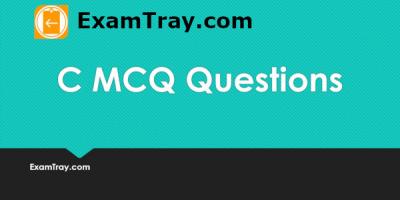
Study C MCQ Questions and Answers on Functions and Pointers. Questions are on Recursion, Pass by Value and Pass By Reference. Attend C technical interviews easily after reading these Multiple Choice Questions.
Go through C Theory Notes on Functions before reading questions.
main()
{
printf("Hello");
}
int main()
{
void show()
{
printf("HIDE");
}
show();
return 0;
}
Notice that show() function is defined inside main() function. It will not produce a compile error. But, it is not recommended to define a FUNCTION INSIDE A FUNCTION. DO NOT DO.
void show();
int main()
{
show();
printf("ARGENTINA ");
return 0;
}
void show()
{
printf("AFRICA ");
}
First show() function is called. So it prints AFRICA first.
int main()
{
show();
printf("BANK ");
return 0;
}
void show()
{
printf("CURRENCY ");
}
Yes. Compiler error. Before calling the show(); function, its Function Prototype should be declared before outside of main() and before main().
void show();
int main()
{
show();
printf("BANK ");
return 0;
}
Using a return val; statement, you can return only one value.
void show();
void main()
{
show();
printf("RAINBOW ");
return;
}
void show()
{
printf("COLOURS ");
}
VOID functions should not return anything. RETURN; is returning nothing.
1. First void main() return; nothing. Still it is valid.
2. Second void show() function is NO RETURN statement. It is also valid.
void show();
void main()
{
printf("PISTA ");
show();
}
void show()
{
printf("CACHEW ");
return 10;
}
void show() function should not return anything. So return 10; is not recommended.
int show();
void main()
{
int a;
printf("PISTA COUNT=");
a=show();
printf("%d", a);
}
int show()
{
return 10;
}
int show() function returns TEN (10). 10 is assigned to a at a=show().
void main()
{
int a;
printf("TIGER COUNT=");
a=show();
printf("%d", a);
}
int show()
{
return 15;
return 35;
}
More than one return statement will not cause Compiler Error. But only FIRST return STATEMENT is executed. Anything after return 15; is not reachable.
int show();
void main()
{
int a;
a=show();
printf("%d", a);
}
int show()
{
return 15.5;
return 35;
}
It is perfectly Okay to return a float number 15.5 as an Integer inside int show() function. 15.5 is demoted to integer as 15 and returned.
int myshow(int);
void main()
{
myshow(5);
myshow(10);
}
int myshow(int b)
{
printf("Received %d, ", b);
}
Notice the function prototype declaration int myshow(int). If you declare wrong either Compiler warning or error is thrown. myshow(5) passes number 5. 5 is received as variable int b.
int myshow(int);
void main()
{
int a=10;
myshow(a);
myshow(&a);
}
int myshow(int b)
{
printf("Received %d, ", b);
}
a is 10. &a is the address of the variable a which is a random memory location. To receive an address, int myshow(int b) should be rewritten as int myshow(int *k).
int myshow(int *);
void main()
{
int a=10;
myshow(&a);
}
int myshow(int *k)
{
printf("Received %d, ", *k);
}
It is called Passing a variable by reference. You are passing &a instead of a. Address of a or &a is received as int *k. Observe the function prototype declaration before main(), int myshow(int *).
void myshow(int *);
void main()
{
int a=10;
printf("%d ", a);
myshow(&a);
printf("%d", a);
}
void myshow(int *k)
{
*k=20;
}
You passed &a instead of a into myshow(int) function. *k=20 changes the valued of passed variable passed by reference.
void myshow(int);
void main()
{
int a=10;
printf("%d ", a);
myshow(a);
printf("%d", a);
}
void myshow(int k)
{
k=20;
}
You passed variable a directly by value. myshow(a). k=20 will not actually change the variable a as variable k and variable a are completely different. It is called Pass By Value.
